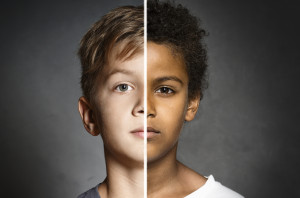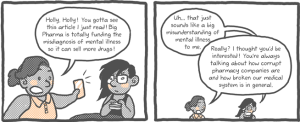
Source: A Celebration of Women
One afternoon in early spring, I was driving with my masculine-of-center presenting girlfriend in the passenger seat.
Since the weather was just starting to allow it, I had the windows down. I was looking for parking and had paused before turning because I thought I saw an open parking spot when a man on the street yelled to me, “Yo, this is a one-way street.”
I said something snarky back to him about minding his own business, and my girlfriend was appalled that I responded so angrily.
I explained to her that I find it really offensive that men feel entitled to explain to me the rules of the road, how to park my car, where to park my car, or various other things they want to mansplain.
Nearly all of the unsolicited driving advice I receive is from some man trying to tell me how to be in the world. Usually I ignore it, but with the windows freshly down and unaccustomed to being able to hear people on the street, my rage trigger was hairpin.
I explained further to my girlfriend that men feel entitled to tell women how to drive because of sexist notions that women don’t know how and that men need to tell them what to do.
My girlfriend countered to me that she thinks my snarky comment was ineffective — that if I want this man to stop mansplaining about driving stuff, I should try to be more compassionate. That from his perspective, he was just trying to help and that I could do more harm than good by barking at him.
Then we got into a fight about intent versus impact, coalition building, and whether I get to have whatever rage I need to in a homophobic, sexist, fatphobic society.
And then I called her a shitty feminist for not standing in solidarity with me.
It’s nice to have arguments with someone you feel comfortable enough with to lob the “You’re a shitty feminist” insult at because I would never actually say that if I were fighting with anyone else. And I actually don’t think my girlfriend is a shitty feminist; if I did, we wouldn’t be dating.
As I unpacked the argument, I felt how cathartic it was to actually call someone a shitty feminist. But then I realized that focusing on the ways in which her feminism was counter to mine (“shitty”) wasn’t actually productive.
Feminism is a huge movement with a metric ton of infighting over exactly the same thing — people not doing feminism the same way rubbing up against each other, which runs counter to effective coalition building.
As bell hooks so simply wrote in Feminism Is for Everybody: “Simply put, feminism is a movement to end sexism, sexist exploitation, and oppression.”
There are all sorts of ways to be a feminist in the world.
If we erased all the ways in which we are different and have different opinions, we would lose so much strength in the movement.
hooks’ definition of feminism was meant to focus on the eradication of sexism rather than creating equality between genders. Sexism is the problem — and those who perpetuate it can be women as well as other genders. The idea of feminism being anti-male is a fallacy perpetuated by the patriarchal mass media.
In my feminism, I think it is important to bring the issues of our most marginalized to the forefront of the movement.
Centering the experience of the oppressions of trans*people, queer folks, people of color, disabled folks, people of size, young folks, elders, sex workers, and other oppressed groups makes for work that actually addresses systemic oppression.
We won’t end sexism without addressing all oppressions; we can’t work together until we agree that none of us are free until we’re all free.
But how can we work together at this point? Can there be space for rage as well as compassion?
I’ve certainly had moments where I could feel both bubbling up equally inside of myself. In those moments, I need to choose a direction, and I don’t think that there’s a right versus wrong when you’re dealing with first-hand oppression.
Last summer, a dude on a train told me as I was standing to exit that I should lose weight. I turned to him as I was leaving, and I told him that my body was none of his business and neither was anyone else’s.
I wish I could always be so eloquent. But most of the time, I ignore it because I fear for my safety.
Oppressed people shouldn’t have to bear the burden of educating theiroppressors — this is the work of allies. Folks who are actively working in solidarity with other people need to step up and do the work of educating their people.
What would have felt a lot better on that train is if someone had voiced on my behalf, telling him in front of that crowded train about how all bodies are good bodies.
My girlfriend strongly believes that coalition building is important and that the only way to do that is to meet folks on common ground, even if that common ground is very small.
This is where her perspective about catching more flies with the honey of compassion rather than my snarky rage comment of vinegar was coming from.
I actually agree wholeheartedly about building coalitions, but I still disagree and believe there needs to be room for rage to be expressed.
There are so many ways in which our feminisms are different — there are plenty of feminists who don’t think the way I do about how oppressions are interlocking.
But there are also so many different ways to go about eradicating sexism maybe there is space for all of us to work together.
Are we going to not go after sexism until all of us finally agree on what and how we’re going to do it? How can we make better allies out of fellow feminists?
Sisterhood is powerful.
But when we can’t look past our disagreements to see the ways in which we intersect, we lose the alchemy of our coalitions.
And at the same time, I don’t think we can overlook the ways in which classism, racism, whorephobia, and other oppressions have fractured and dismantled the feminist movement.
But are there ways in which we can work as a movement together even though we are coming from different places?
In the instance of the mansplaining driving incident, maybe my masculine-of-center girlfriend could use her masculine privilege to act in solidarity with me by educating the man on the street in a “Hey dude, I know your intent is coming from a good place, but why don’t you trust that she knows what she’s doing?”
In that instance, it was the ally in this situation — the masculine presenting person — who could have used the tool of compassion to bring this man education that might maybe change his heart and mind about sexism. Maybe.
But I certainly don’t think it was my job to treat it with compassion as a “teaching moment.”
For me, this work within feminism is important.
As a white feminist, it’s important for me to call out racist actions when I see them within feminist movements — working to end oppression within the movement makes it stronger.
But I can call out the racism in a compassionate way and work with folks to do things better rather than simply calling it out with rage, the way I might if I was confronted with fatphobia as a fat person directly, or homophobia as a queer.
There’s obviously no simple answer to this. If there was, we would have solved it.
We need better ally skills as a movement, and feminists need to start seeing the term “ally” as a verb instead of a noun.
We need to learn to find more common ground.
And we need to learn how to make space for compassion as well as rage.
[do_widget id=”text-101″]
Want to discuss this further? Visit our online forum and start a post!
Bevin Branlandingham is an ultra rad warrior for self-acceptance. She is a writer, performer, and cultural producer in Brooklyn, NY who believes that all bodies are good bodies and works to make the world safe for people to love themselves. She has run the body positive queer party Rebel Cupcake for the past three years. She blogs about dating, fashion for all genders and body types, spirituality and self-love at queerfatfemme.com and offers body liberation coaching one on one and through workshops. Follow her on Twitter @QueerFatFemme.
Search our 3000+ articles!
Read our articles about:
Our online racial justice training
Used by hundreds of universities, non-profits, and businesses.
Click to learn more




















